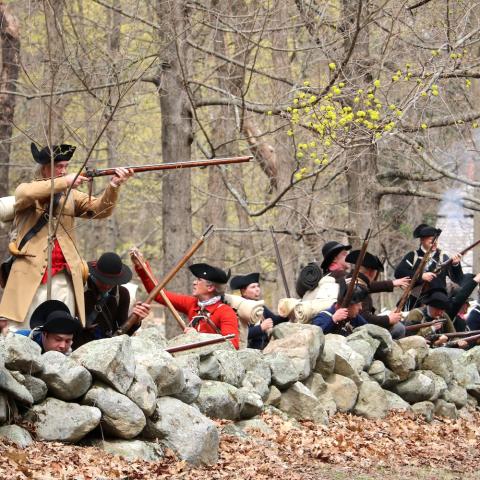
Musket ball recovered at Minute Man National Historical Park/NPS
National Park Service archaeologists working at Minute Man National Historical Park in Massachusetts recently discovered five musket balls that were fired during the world-changing event known as “The Shot Heard Round the World” on April 19, 1775.
Early analysis of the 18th-century musket balls indicates they were fired by colonial militia members at British forces during the North Bridge fight. The North Bridge battle site in Concord, Massachusetts, is a key location within Minute Man NHP and marks the moment when provincial militia leaders ordered members to fire upon their own government’s soldiers for the first time. The event was later termed “The Shot Heard Round the World” by Ralph Waldo Emerson in his 1837 Concord Hymn because it immediately escalated an already boiling conflict between colonial rebels and British forces.
The musket balls were discovered by archaeologists conducting compliance activities in preparation for the park’s Great American Outdoors Act project. The musket balls were found in an area where, according to contemporary accounts, British soldiers formed up to resist the river crossing. Further analysis of the musket balls indicates that each one was fired from the opposite side of the river and not dropped during the process of reloading.
“It’s incredible that we can stand here and hold what amounts to just a few seconds of history that changed the world almost 250 years ago,” said Minute Man park ranger and historic weapons specialist Jarrad Fuoss. “These musket balls can be considered collectively as ‘The Shot Heard Round the World,’ and it is incredible that they have survived this long. It is also a poignant reminder that we are all stewards of this battlefield and are here to preserve and protect our shared history.”
Visitors can view the musket balls and learn more about “The Shot Heard Round the World” at Minute Man NHP on Saturday, July 13, during the park’s Archeology Day events:
North Bridge Visitor Center (174 Liberty Street in Concord)
- 10 a.m. to 4:30 p.m. — Members of the public can view the musket balls on display at the North Bridge Visitor Center. Visitors can talk to park curators about the musket balls and the science behind preserving them.
- 2:30 p.m. — “North Bridge Battle Walk”: Visitors can join park rangers for an interactive walking tour tracing the footsteps and the archaeology of those who fought at the North Bridge on April 19, 1775.
Minute Man Visitor Center (210 North Great Road in Lincoln)
- 11 a.m. — “Investigating Hallowed Ground: Battlefield Archeology at Minute Man National Historical Park,” with Joel Dukes, NPS Northeast Region Archeology Program.
- 1 p.m. — “Arms, Ammunition, and Archaeology: A Scientific Look at April 19, 1775,” with Joel Bohy, director of Historic Arms & Militaria at Blackstone Valley Auctions.
The event is co-sponsored by Friends of Minute Man National Park.
The North Bridge musket ball discovery opens another window to the events of April 19, 1775, and presents the tangible reality citizens of Massachusetts faced nearly 250 years ago. Each year, succeeding generations commemorate the events of that day known collectively as the Battle of Lexington and Concord.
On that day, roughly 800 British soldiers marched from Boston to Concord to destroy military supplies that colonial rebels had gathered. Thousands of militia members intercepted the British advance thanks to a system of midnight riders who gave warning the night before. Near dawn, a brief encounter between militia members and British soldiers on Lexington Green left eight militia dead and 10 wounded. Once the British Regulars arrived in Concord, a detachment of roughly 200 Redcoats marched over the North Bridge as they headed for the home of Col. James Barrett. British informants believed Barrett had stockpiled military goods on his farm, including several artillery pieces. At the North Bridge, British forces left 96 soldiers to protect the river crossing.
Soon, the number of militia members and local Minute Men grew on the hills northwest of Concord. A plume of smoke rising above the town center spurred the militia into action, as they feared British troops had started to burn the colonists’ homes. The militia loaded their weapons and began to march. As the head of the militia neared the North Bridge, the British soldiers panicked and began firing. Musket balls slammed into the provincial soldiers, and Maj. John Buttrick of Concord issued his famous order: “Fire! Fellow soldiers. For god’s sake, fire!” The militia fired heavily into the British ranks and charged across the bridge. Under heavy gunfire, the British ranks dissolved, and the soldiers retreated to their reinforcements near Concord center. The fighting at the North Bridge lasted less than three minutes; but when the smoke cleared, 18 men lay dead or wounded. Three British soldiers killed in the engagement remain buried in Concord to this day.
The recent archaeological survey was conducted by trained professionals using scientific techniques specifically meant to preserve and document the findings within their archaeological context. Metal detecting, relic hunting, and other forms of looting are strictly prohibited on NPS land. The NPS is reminding visitors that violating the Archaeological Resources Protection Act can result in felony charges, including up to five years in prison and fines of more than $100,000. To learn more about ARPA and the ethics of protecting resources in Minute Man National Historical Park visit https://www.nps.gov/mima/don-t-touch-it-protecting-archaeological-resources-in-minute-man-nhp.htm
To learn more about the battle on April 19, 1775, visit https://www.nps.gov/mima/learn/historyculture/april-19-1775.htm
To learn about the 250th Anniversary of the American Revolution at Minute Man National Historical Park visit: https://www.nps.gov/mima/mima250.htm


 Support Essential Coverage of Essential Places
Support Essential Coverage of Essential Places







Comments
What a remarkable find in our country's history!